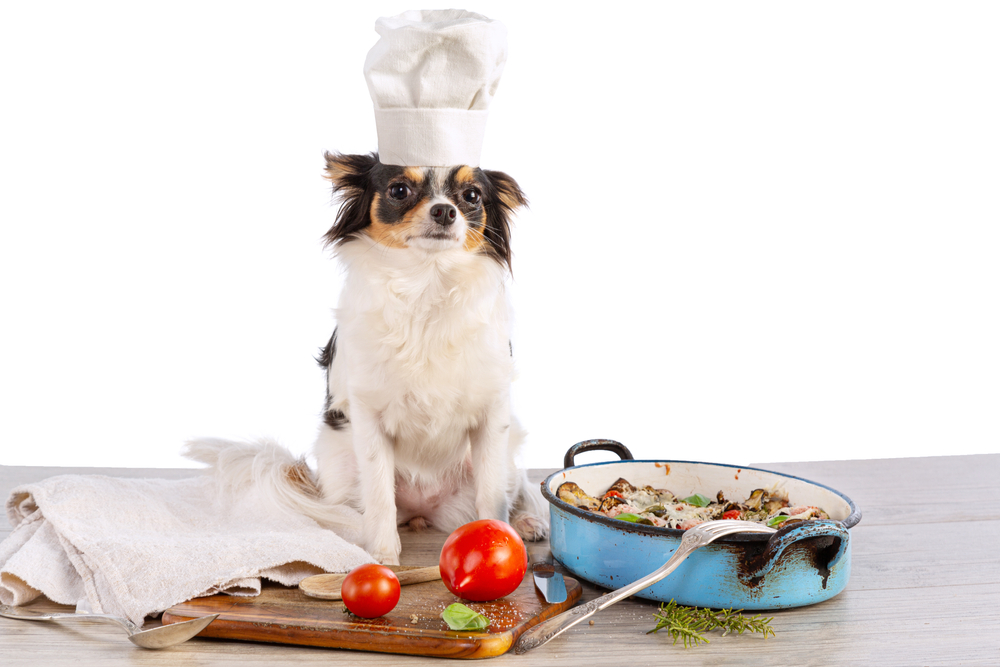
Eating a balanced, nutritious diet is important for all domestic pets, no matter what age or type of animal. Growing puppies require specific nutrients in order to develop and live their healthiest lives. If you’re recently taken home a new puppy, then your vet probably recommended that you feed your fur baby nutrient-rich puppy food, […]
Eating a balanced, nutritious diet is important for all domestic pets, no matter what age or type of animal. Growing puppies require specific nutrients in order to develop and live their healthiest lives.
If you’re recently taken home a new puppy, then your vet probably recommended that you feed your fur baby nutrient-rich puppy food, and may even have suggested certain trustworthy brands.
In addition to feeding your puppy nutrient-rich, wholesome puppy food, you can enhance your growing puppy’s diet by incorporating the following 6 dietary ingredients.
Your puppy has obviously completed the weaning process and has said goodbye to his mother’s nursing milk. Puppies transition from milk to puppy food towards the tail-end of their first 8 weeks of life. This means that when you take your new puppy home, the little guy is still getting used to digesting puppy food.
Just like babies, puppies can get upset stomachs and have gas during this transition phase. Digestive enzymes can help alleviate some of these difficulties and ensure that your puppy doesn’t have to suffer any discomfort.
Digestive enzymes are a dietary supplement that breaks down macronutrients into smaller “building blocks” so that your puppy’s metabolism can easily assimilate the nutrients. Without adding digestive enzymes to your puppy’s meals, your fur baby could “poop and pee out” a portion of the nutrients they eat.
By feeding your puppy these enzymes, the supplement will break down carbohydrates, proteins, and fats from their puppy food so that these macronutrients are fully “bio available,” in other words fully “used.”

As long as your puppy is at least 12 weeks old, adding “meal toppers” to his diet can add a ton of high-quality nutrition to his food. Meal toppers consist of whole meats along with a hearty blend of nutrient-dense fruits and vegetables. Meal toppers come either wet or dry. Simply add a layer of the meal topper to your puppy’s plate of puppy food, and he’ll gobble it up!
Using meal toppers also improves the taste of puppy food. If you’ve noticed you have a picky puppy who doesn’t necessarily love his food, then adding a tasty meal topper can do the trick. As your puppy grows and matures into an adult dog, you can continue to add meal toppers to his food to ensure that he continues to get maximum nutrition.
We would first like to mention that not all vegetables are good for dogs. However, by adding the right vegetables to your puppy’s diet once or twice a week as a fun treat can definitely help boost his nutrition, not to mention make life a bit more exciting!
Vegetables that are safe for dogs include pumpkin, spinach, and sweet potatoes.
When cooked properly to release vital nutrients, pumpkins can provide your puppy with healthy fiber to promote proper digestion.
Spinach is a source of the nutrient-rich antioxidants beta carotene, iron, vitamin A, vitamin B, vitamin C, and vitamin K, and is also a digestive stimulant.
Rich in dietary fiber, potassium, manganese, vitamin A, vitamin B6, and vitamin C, sweet potatoes are a favorite among dogs, so your puppy is sure to love this tasty treat.
The more protein your puppy consumes throughout puppyhood, the better. Proteins from meats such as beef, chicken, and other game are the most bio-available to your growing puppy. And fish and eggs are also rich in valuable protein for your growing puppy.
This is something to bear in mind as you prepare your own food. Are you cooking chicken? As long as you don’t season it, feel free to set aside a small portion for your puppy. Whatever meat you want to give your puppy, be sure to cut it up into very small bites since puppies are known to inhale their food and are at a higher risk of choking than adult dogs.
If you want to feed eggs to your puppy, a boiled egg would be best. You can slice it up and it to your puppy’s regular puppy food, or give it to him as a special treat.

The puppy food you feed to your new fur baby will likely be rich in omega-6 fatty acids if you choose a very high quality brand. If for some reason the puppy food you have doesn’t include fish oils and other omega-6 sources, you can actually add these essential fatty acids to your puppy’s diet.
Most essential fatty acids for puppies will come in the form of “chews,” which are little bite-sized treats. You can sprinkle a few on top of your puppy’s meal. Or, as a fun idea, you can use these tasty chews during puppy training. Using treats as incentives during housebreaking and training is a great form of positive reinforcement, so why not make sure those treats are super nutritious?
Lastly, the sixth way to improve your puppy’s diet is by supplying protein from dairy. Unlike protein from meat, dairy protein provides puppies with vitamin D and other vital nutrients that meat lacks.
Dairy protein sources that are safe for puppies are cottage cheese and goat’s milk. We recommend avoiding highly processed cheeses like cheddar, because processed “hard” cheeses could cause constipation, or worse, sudden diarrhea. Soft cheeses like goat’s milk are richly supplied with healthy bacteria which makes the cheese easier to digest.
That concludes the 6 ways that you can improve your puppy’s diet. What do you think? If you would like to add a new fur baby to your life, Petland Florida can introduce you to the best breeds for you! Stop in our Florida locations or meet our puppies for sale online.